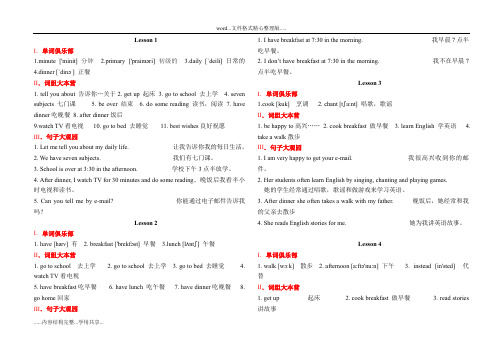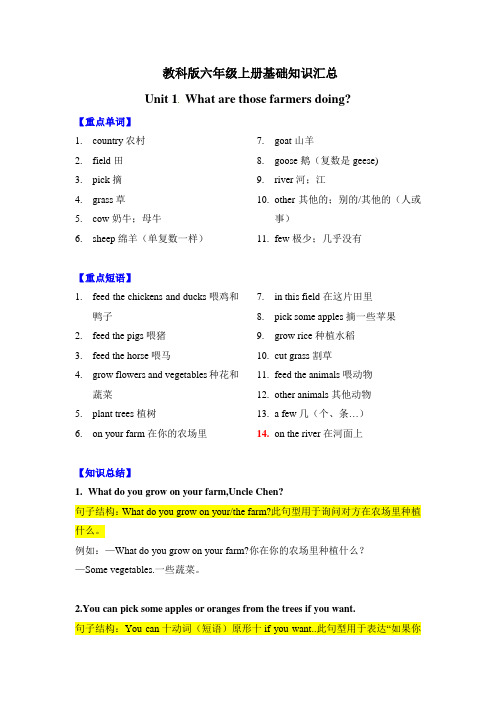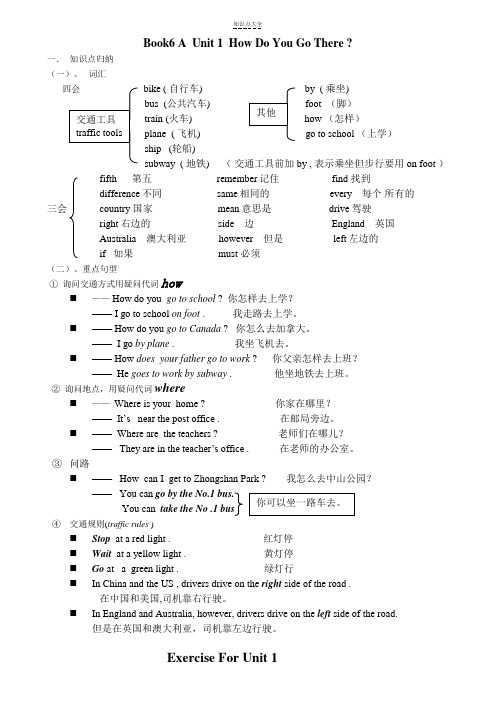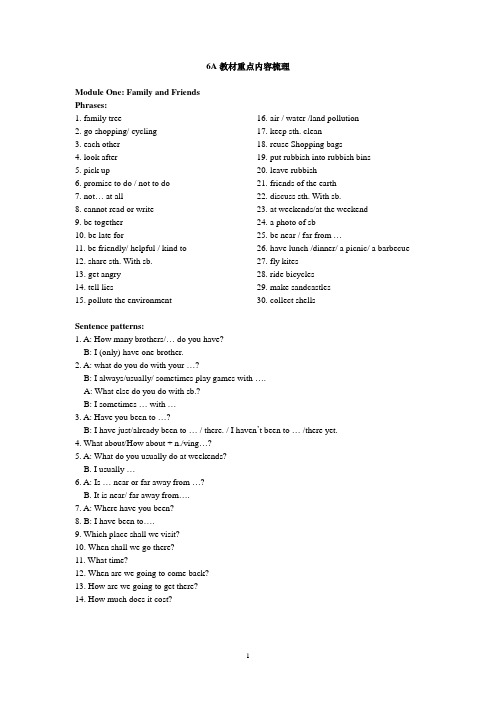六年级英语第一学期重点单词和句型_6
人版精通英语六年级上学期重点词组句型

Lesson 1I.单词俱乐部1.minute ['minit] 分钟2.primary ['praiməri] 初级的3.daily [`deili] 日常的4.dinner [`dinə ] 正餐II.词组大本营1. tell you about 告诉你…关于2. get up 起床3. go to school 去上学4. seven subjects 七门课5. be over 结束6. do some reading 读书,阅读7. have dinner吃晚餐8. after dinner饭后9.watch TV看电视10. go to bed 去睡觉11. best wishes良好祝愿III.句子大观园1. Let me tell you about my daily life. 让我告诉你我的每日生活。
2. We have seven subjects. 我们有七门课。
3. School is over at 3:30 in the afternoon. 学校下午3点半放学。
4. After dinner, I watch TV for 30 minutes and do some reading.. 晚饭后我看半小时电视和读书。
5. Can you tell me by e-mail? 你能通过电子邮件告诉我吗?Lesson 2I.单词俱乐部1. have [hæv] 有2. breakfast ['brekfəst] 早餐3.lunch [lʌntʃ] 午餐II.词组大本营1. go to school 去上学2. go to school 去上学3. go to bed 去睡觉4. watch TV看电视5. have breakfast吃早餐6. have lunch 吃午餐7. have dinner吃晚餐8. go home回家III.句子大观园1. I have breakfast at 7:30 in the morning. 我早晨7点半吃早餐。
新教科版(广州)英语六年级上册全册知识点归纳

教科版六年级上册基础知识汇总Unit 1 What are those farmers doing? 【重点单词】1.country农村2.field田3.pick摘4.grass草5.cow奶牛;母牛6.sheep绵羊(单复数一样)7.goat山羊8.goose鹅(复数是geese)9.river河;江10.other其他的;别的/其他的(人或事)11.few极少;几乎没有【重点短语】1.feed the chickens and ducks喂鸡和鸭子2.feed the pigs喂猪3.feed the horse喂马4.grow flowers and vegetables种花和蔬菜5.plant trees植树6.on your farm在你的农场里7.in this field在这片田里8.pick some apples摘一些苹果9.grow rice种植水稻10.cut grass割草11.feed the animals喂动物12.other animals其他动物13.a few几(个、条…)14.on the river在河面上【知识总结】1.What do you grow on your farm,Uncle Chen?句子结构:What do you grow on your/the farm?此句型用于询问对方在农场里种植什么。
例如:—What do you grow on your farm?你在你的农场里种植什么?—Some vegetables.一些蔬菜。
2.You can pick some apples or oranges from the trees if you want.句子结构:You can十动词(短语)原形十if you want..此句型用于表达“如果你想要的话,你可以…”。
if是连词,在这里用于引导条件状语从句,意为“如果”。
can是情态动词,与动词原形搭配使用。
英语六年级上册单词表全部重点

英语六年级上册单词表全部重点本文将详细介绍英语六年级上册单词表的全部重点,包括每个单词的中文意思、音标、词性以及用法等方面的内容,旨在帮助读者更好地掌握这些单词。
Unit 11. computer:计算机 [kəmˈpju:tər] n.- I use the computer to do my homework.2. mobile:手机 [ˈməʊbaɪl] n.- Can I borrow your mobile?3. sandwich:三明治 [ˈsænwɪdʒ] n.- I had a chicken sandwich for lunch.4. playground:操场[ˈpleɪɡraʊnd] n.- We played football on the playground after school.5. library:图书馆 [ˈlaɪbrəri] n.- I go to the library every Saturday to borrow books.6. canteen:食堂[kænˈti:n] n.- We have lunch in the school canteen.7. science:科学 [ˈsaɪəns] n.- I like studying science because it's interesting.8. P.E. (Physical Education):体育 [ˌpi: ˈi:] n.- We have P.E. class every Monday and Thursday.9. Music:音乐 [ˈmju:zik] n.- I enjoy listening to music in my free time.10. art:美术 [ɑ:rt] n.- We have an art lesson this afternoon.Unit 21. colour:颜色 [ˈkʌlər] n.- My favorite colour is blue.2. red:红色 [red] adj.- Her dress is red.3. blue:蓝色 [blu:] adj.- The sky is blue.4. yellow:黄色 [ˈjeləʊ] adj.- The sunflower is yellow.5. green:绿色 [ɡri:n] adj.- The grass is green.6. black:黑色[blæk] adj.- I'm wearing a black jacket.7. white:白色 [waɪt] adj.- The snow is white.8. brown:棕色 [braʊn] adj.- I have a brown dog.9. orange:橙色 [ˈɔrɪndʒ] adj.- I like eating oranges.10. pink:粉色 [pɪŋk] adj.- She is wearing a pink dress.Unit 31. rabbit:兔子 [ˈræbɪt] n.- There are many rabbits in the park.2. snake:蛇 [sneɪk] n.- Be careful! There is a snake.3. bird:鸟 [bɜ:d] n.- Look! There is a bird in the tree.4. elephant:大象 [ˈelɪfənt] n.- Elephants are very big animals.5. panda:熊猫 [ˈpændə] n.- Pandas eat bamboo.6. monkey:猴子 [ˈmʌŋki:] n.- Monkeys are good at climbing trees.7. tiger:老虎 [ˈtaɪɡər] n.- Tigers are strong and fierce.8. lion:狮子 [ˈlaɪən] n.- The lion is the king of the jungle.9. kangaroo:袋鼠[kæŋɡəˈru:] n.- Kangaroos can jump very high.10. giraffe:长颈鹿 [dʒɪˈrɑ:f] n.- Giraffes have long necks.Unit 41. supermarket:超市 [ˈsu:pərmɑ:rkɪt] n.- I like shopping in the supermarket.2. station:车站 [ˈsteɪʃən] n.- We are waiting for the train at the station.3. post office:邮局 [poʊst ˈɔfɪs] n.- Let's go to the post office to send a letter.4. museum:博物馆 [mju:ˈzi:əm] n.- There are many interesting things in the museum.5. hospital:医院 [ˈhɑ:spɪtl] n.- He is sick and needs to go to the hospital.6. cinema:电影院 [ˈsɪnəmə] n.- I want to watch a movie in the cinema.7. hotel:旅馆 [hoʊˈtel] n.- We are staying at a hotel.8. park:公园 [pɑ:rk] n.- Let's take a walk in the park.9. school:学校 [sku:l] n.- I go to school from Monday to Friday.10. bank:银行[bæŋk] n.- I need to go to the bank to withdraw money.Unit 51. house:房子 [haʊs] n.- My house is near the school.2. street:街道 [strit] n.- We live on Maple Street.3. city:城市 [ˈsɪti] n.- My favorite city is New York.4. country:国家 [ˈkʌntri] n.- I'm proud to be an American.5. planet:星球 [ˈplænɪt] n.- Earth is the third planet from the Sun.6. sun:太阳 [sʌn] n.- The sun rises in the east.7. moon:月亮 [mu:n] n.- The moon is Earth's natural satellite.8. star:星星 [stɑ:r] n.- There are many stars in the sky.9. planetarium:天文馆 [ˌplænɪˈteəriəm] n.- We visited the planetarium last week.10. telescope:望远镜 [ˈtelɪskoop] n.- Astronomers use telescopes to observe celestial bodies. Unit 61. family:家庭 [ˈfæmɪli] n.- My family is very important to me.2. mother:母亲 [ˈmʌðər] n.- My mother is a teacher.3. father:父亲 [ˈfɑ:ðər] n.- My father is a doctor.4. brother:兄弟 [ˈbrʌðər] n.- I have a younger brother.5. sister:姐妹 [ˈsɪstər] n.- My sister is studying in college.6. grandmother:祖母 [ˈɡrænmʌðər] n.- I love spending time with my grandmother.7. grandfather:祖父 [ˈɡrænfɑ:ðər] n.- My grandfather is a veteran.8. friend:朋友 [frend] n.- I have many friends at school.9. teacher:老师 [ˈteɪtʃər] n.- My favorite teacher is Mrs. Smith.10. doctor:医生 [ˈdɑ:ktər] n.- The doctor will see you now.Unit 71. pen:钢笔 [pen] n.- I lost my pen. Can I borrow yours?2. pencil:铅笔 [ˈpensəl] n.- I prefer using a pencil to write.3. ruler:尺子 [ˈru:lər] n.- Can you pass the ruler, please?4. eraser:橡皮 [ɪˈreɪsər] n.- Use an eraser to correct your mistakes.5. notebook:笔记本 [ˈnʊtbɔ:k] n.- I keep my homework in my notebook.6. calculator:计算器[kælˈkʌlətər] n.- We use calculators in math class.7. book:书 [bʊk] n.- I read a book every night before bed.8. library:图书馆 [ˈlaɪbrəri] n.- The library is a great place to study.9. computer:计算机 [kəmˈpju:tər] n.- We have a computer lab at school.10. internet:互联网 [ˈɪntərnet] n.- I often use the internet to research information. Unit 81. hobby:爱好 [ˈhoʊbi] n.- My hobby is playing the guitar.2. sport:运动 [spɔ:rt] n.- I enjoy playing soccer on the weekends.3. music:音乐 [ˈmju:zik] n.- I love listening to all kinds of music.4. art:艺术 [ɑ:rt] n.- My sister is taking art lessons.5. reading:阅读 [ˈri:dɪŋ] n.- I like reading books in my free time.。
教科版六年级英语上学期知识点

foot-feet tooth-teeth
单复同行:
fish-fish sheep(羊)-sheep people-people
Chinese-Chinese Japanese-Japanese
不可数名词:water(水) milk(牛奶) tea(茶) rice(米饭) orange(橙汁)juice(果汁)bread(面包)等
二、句子
1. What’s matter with you?
2. I have a stomachache.
3. I’m sorry to hear that.
4. You should see a doctor.
5. I think you’ll be well soon.
6. He asked me to take this medicine three times a day for a week.
如:It’s six o’clock.现在六点了。(时间)It’s sunny today.今天天气晴朗。(天气)
2)表示不明性别的婴儿、动物或不明身份、不确定的人。
如:-----Who’s knocking? -----It’s me.It’s a cute baby.
3)用来指代前面提到过的事物。
否定回答:No,主语+didn’t.
Yes, I did
No, I didn’t
特殊疑问句
特殊疑问词+did+主语+动词原形+其他?
-What did you do yesterday?
-I made a cake yesterday
人教版小学英语六年级上unit1~unit6知识点归纳及练习

Book6 A Unit 1 How Do You Go There ?一. 知识点归纳(一)、 词汇bike ( 自行车乘坐)公共汽车(脚) 火车(怎样) 飞机(上学)轮船)地铁) ( 交通工具前加by , 表示乘坐但步行要用on foot )fifth 第五 remember 记住 find 找到difference 不同 same 相同的 every 每个 所有的三会 country 国家 mean 意思是 drive 驾驶right 右边的 side 边 England 英国Australia 澳大利亚 however 但是 left 左边的if 如果 must 必须(二)、重点句型① 询问交通方式用疑问代词how⏹ —— How do you go to school ? 你怎样去上学?—— I go to school on foot . 我走路去上学。
⏹ —— How do you go to Canada ? 你怎么去加拿大。
—— I go by plane . 我坐飞机去。
⏹ —— How does your father go to work ? 你父亲怎样去上班?—— He goes to work by subway . 他坐地铁去上班。
② 询问地点,用疑问代词where⏹—— Where is your home ? 你家在哪里? —— It’s near the post office . 在邮局旁边。
⏹ —— Where are the teachers ? 老师们在哪儿?—— They are in th e teacher’s office . 在老师的办公室。
③ 问路⏹ —— How can I get to Zhongshan Park ? 我怎么去中山公园?—— You can go by the No.1 bus. You can take the No .1 bus .④ 交通规则(traffic rules )⏹Stop at a red light . 红灯停 ⏹Wait at a yellow light . 黄灯停 ⏹Go at a green light . 绿灯行 ⏹In China and the US , drivers drive on the right side of the road . 在中国和美国,司机靠右行驶。
6A上海牛津英语六年级第一学期重点词组和句型

6A教材重点内容梳理Module One: Family and FriendsPhrases:1. family tree2. go shopping/ cycling3. each other4. look after5. pick up6. promise to do / not to do7. not… at all8. cannot read or write9. be together10. be late for11. be friendly/ helpful / kind to12. share sth. With sb.13. get angry14. tell lies15. pollute the environment 16. air / water /land pollution17. keep sth. clean18. reuse Shopping bags19. put rubbish into rubbish bins20. leave rubbish21. friends of the earth22. discuss sth. With sb.23. at weekends/at the weekend24. a photo of sb25. be near / far from …26. have lunch /dinner/ a picnic/ a barbecue27. fly kites28. ride bicycles29. make sandcastles30. collect shellsSentence patterns:1. A: How many brothers/… do you have?B: I (only) have one brother.2. A: what do you do with your …?B: I always/usually/ sometimes play games with ….A: What else do you do with sb.?B: I sometimes … with …3. A: Have you been to …?B: I have just/already been to … / there. / I haven’t been to … /there yet.4. What about/How about + n./ving…?5. A: What do you usually do at weekends?B. I usually …6. A: Is … near or far away from …?B. It is near/ far away from….7. A: Where have you been?8. B: I have been to….9. Which place shall we visit?10. When shall we go there?11. What time?12. When are we going to come back?13. How are we going to get there?14. How much does it cost?Module Two: Places and Activities Phrases:1. a bank clerk2. a shop assistant3. put out fires4. cook food5. make our city a safe place6. look at7. listen to8. arrive at9. have tea10. at the entrance11. on the ground/ first floor12. on the open day13. at half past eight in the morning14.First,../ Next,…/Then,…/After that,…/Finally, …15.take photos16. by ferry/ by underground/ on foot17. on the bus 18. go to school19. a lot of/ some/ a few20.live near/far away from school21.an advertisement board22. light rail23. a department store24. a housing estate25. a police station26. half an hour27. wait for28. walk on the grass29. keep quiet30. run across the road31. pick the flowers32. turn left/right33. on the right/left34. in the middle35. go upstairsSentence patterns:1.A: Would you like to be a/an…?B: Yes, I would.//No, I wouldn’t.A: Why?/Why not?B: I would /wouldn’t like to be a/an…because I…2.A: What would you like to be?B: I would like to be…3.A: Do you live near or far away from …?B: I live near/far away from ….A: How do you go to school?B: I go to school by…/on foot.A: How long does it take?B: It takes …4.A: How long does it take you to get to…?B: It takes me about…to get there.5.A: What does Simon see when he is walking to school?B: Simon sees ...when he is walking to school.6. What does this sign mean?7. We must not eat or drink./Don’t eat or drink.8. We must …9. A: Which escalator must we use?B: We must use the one in the middle.Module Three: Food and Drink phrases1. fried cabbage/chicken wings2. steamed prawns with garlic3. boiled eggs4. a shopping list5. at the vegetable stall6. in the frozen food section7. in the market/supermarket8. have a picnic9. a bottle of jam10. a packet of nuts11. a slice / slices of 12. an unhealthy diet13. do exercise14. live in the countryside15. stay with sb.16. plenty of / a lot of17. a little/ some18. my favourite breakfast19. too much spicy food20. eating habits21.the food pyramidSentence patterns:1.A: What would you like for dinner tonight?B: I’d like … for dinner.A: What kind of … would you like?Would you like … or …?B: I’d like…2.A: Have you bought any…?B: Yes, I’ve bought some…A: Where did you buy it/them?B: In the market, at the…stall/in the…section.A: How much was it/were they?B: It was /They were…yuan.3.A: Shall we buy some soft drinks?B: Ok./ That’s a good idea.4.Let’s buy some bread and a bottle of jam.Let’s go to the supermarket to buy some food and drink for the picnic.5.A: Would you like some…?B: No, thanks / yes, please6.A: Why do you like…?B: I like it/them because it’s/they’re sweet/delicious/tasty/spicy.7.A: Why not?B: I don’t want … because it is too ….8.A: May I have some …, please?B. Ok/ Sure/ All right/ Yes, you may. Here you are.//NO, you may not./ I’m afraid you can’t..9.A: How much sugar do we need every day?B: We need a little sugar every day.10.A: Which one was healthier/less healthy?B: …’s diet was healthier than/less healthy than/as healthy as/as unhealthy as …’s diet.11.How much … do we need?12.What do you usually have for breakfast/ lunch /dinner?13.A: What did you have for breakfast yesterday?。
六年级上册英语知识点归纳
Unit 1 The king's new clothes1、一般过去时●一般过去时的概念一般过去时表示过去某个时间发生的动作或存在的状态。
●一般过去时的形式○1be动词的一般过去时形式be动词的一般过去时的构成是“主语+be(was/were)+其他”。
例如:I was ill yesterday. 我昨天生病了。
The boys were happy last weekend. 男孩们上周末很开心。
○2实义动词的一般过去时形式实义动词的一般过去时的构成是“主语+动词的过去式+其他”。
例如:She went shopping last Sunday. 她上周日去购物了。
I caught a big fish on the farm last weekend. 我上周末在农场抓了一条大鱼。
●一般过去时的句型○1肯定句:“主语+谓语动词的过去式+其他”。
例如:It was rainy yesterday. 昨天下雨了。
We had a picnic last week. 上周我们去野餐了。
○2否定句:“主语 +was/were +not+ 其他”或者“主语+didn't+谓语动词原形+其他”。
例如:It wasn't rainy yesterday. 昨天没下雨。
We didn't have a picnic last week. 上周我们没有去野餐。
○3一般疑问句及回答:“Was/Were+主语+其他”或者“Did+主语+谓语动词原形+其他”,其肯定回答分别为“Yes,主语+did”或“Yes,主语+was/were”,否定回答分别为“No,主语+didn't”或“No,主语+wasn't/weren't”。
例如:—Was it rainy yesterday? 昨天下雨了吗?—Yes, it was. 是的,下雨了。
—Did you have a picnic last week? 你们上周去野餐了吗?—No, we didn't. 不,我们没有去。
六年级英语上册U6知识点及习题
Unit 6 The secret to good health 【单词回顾】秘密_______ 简单的_______ 最少_______ 节食_______ 较少的________ 多油的_______ 最后地_________ 甚至_________微笑________ 至少__________ 保持一个良好的饮食习惯________________一、短语:take exercise, stay healthy, at least, keep a good diet…二、句型:1. First, get plenty of sleep.2. Don’t eat too much sweet or oily food.3. How old does Mr Li look?4. Get up early and go to bed early.三、重点精析:1. Keep a good diet. 保持一个良好的饮食习惯。
on diet 节食;减肥balanced diet 均衡饮食2. Eat more vegetables and less meat. 多吃蔬菜,少吃肉。
less是little的比较级less than 少于less and less 越来越少3. First, get plenty of sleep, at least 8 hours each night.首先,要有充足的睡眠,每晚至少有八个小时的睡眠。
分析:at least意思是“至少,不是少于”,是副词短语,可以修饰动词或整个句子,用来强调程度或数量。
4. Don’t eat too much sweet or oily food. 不要吃太多糖和油腻食物。
分析:这是一个否定祈使句。
祈使句是用来表达命令、请求、劝告、警告、禁止等语气的句子。
祈使句有以下几种类型:1)Do型----Do(表示行为的动词原形)+宾语+…Take the No.7 bus over there. Open the door.2)Be型----Be+名词/ 形容词+…Be quirt! Be careful.3)Let型----Let+宾语(通常是第一或第三人称宾格)+动词原形+…Let’s go home.4)Don’t型----Don’t+动词原形+…Don’t read in the sun.5)No型----No+名词或动词ing形式.No photos! No smoking!【巧记】祈使句句型口诀:祈使句,无主语,只用谓语就可以。
2020年PEP人教版英语六年级上册 各单元重点词汇句型归纳整理
用法1.表示事物或人物的特征、状态。
如:The sky is blue.天空是蓝色的。
2.表示经常性或习惯性的动作。
如:I get up at six every day.我每天六点起床。
3.表示客观现实。
如:The earth goes around the sun.地球绕着太阳转。
结构:1.be动词:主语+be(am,is,are)+其它。
如:I am a boy.我是一个男孩。
2.行为动词:主语+行为动词(+其它)。
如:We study English.我们学习英语。
当主语为第三人称单数(he, she, it)时,要在动词后加“-s”或“-es”。
如:Mary likes Chinese.玛丽喜欢汉语。
否定句,一般疑问句,特殊疑问句变化1.be动词的变化。
(1)否定句:主语+ be + not +其它。
如:He is not a worker.他不是工人。
(2)一般疑问句:Be +主语+其它?如:—Are you a student?—Yes. I am. / No, I’m not.(3)特殊疑问句:疑问词+一般疑问句?如:Where is my book?2.行为动词的变化。
(1)否定句:主语+ don’t( doesn’t ) +动词原形+其它。
如:I don’t like milk.当主语为第三人称单数时,要用doesn’t构成否定句。
如:He doesn’t often play football.(2)一般疑问句:Do( Does ) +主语+动词原形+其它?如:—Do you often play the piano?—Yes, I do. / No, I don’t.当主语为第三人称单数时,要用does构成一般疑问句。
如:—Does she go to work by bike?—Yes, she does. / No, she doesn’t.(3)特殊疑问句:疑问词+一般疑问句?如:How does your mother go to work?一、一般过去时的概念一般过去时表示过去某个时间发生的动作或状态。
(精心归纳总结)六年级英语上册重点知识
他喜欢猜字谜和远足吗?
—Yes, he does.是的,他喜欢。
句型
1.询问爱好的句型
固定句型:What is/are +one’s+ hobby/hobbies? (……有什么爱好?)
答语:人+like(s) doing…(……喜欢做……)
—She is a nurse.她是一名护士。
2.用句型“Where does+主语(第三人称单数)+work?”询问某人的工作地点。用句型“主语(第三人称单数)+works +(表示地点的)介词短语。”回答。如:
—Where does your father work?你爸爸在哪儿工作?
—He works in a car factory.他在一家汽车工厂工作。
wash clothes洗衣服draw pictures画画
make a snowman堆雪人go for a picnic去野餐
句子
1.—What are you going to do tomorrow?你明天打算做什么?
—I’m going to have an art lesson.我要上美术课。
5. Some children go to school on foot in Munich, Germany.
在德国慕尼黑,一些孩子们步行上学。
句型
1.询问出行方式的句型及答语。
用How do you come/go (to)…?句型询问,用I come/go (to)+地点+ on foot/ by bike/ by car…句型作答。
- 1、下载文档前请自行甄别文档内容的完整性,平台不提供额外的编辑、内容补充、找答案等附加服务。
- 2、"仅部分预览"的文档,不可在线预览部分如存在完整性等问题,可反馈申请退款(可完整预览的文档不适用该条件!)。
- 3、如文档侵犯您的权益,请联系客服反馈,我们会尽快为您处理(人工客服工作时间:9:00-18:30)。
六年级英语第一学期重点单词和句型
教师:电话:
Unit One How do you go there?
单词:by plane坐飞机by ship坐船on foot 走路by bike 骑车by bus 坐公共汽车by train 坐火车by subway坐地铁traffic lights交通灯traffic rules 交通规则stop at…
在。
停wait at…在。
等
Let’s talk:
1)A: How do you go to school, Sarah?(你是怎样去学校的,Sarah?)
B: My home is near. Usually I go to school on foot.(我的家很近,我经常步行去学校。
)
Sometimes I go by bike. What about you?(我有时候骑自行车去,你呢?)
A: I usually go to school by bus.(我经常乘公交车去上学)
2)A: How can I go to Zhongshan Park?(我怎样才能去中山公园?)
B: You can go by the No.15 bus.(你可以乘坐15路公交车)
A: Can I go on foot?(步行可以吗?)
B: Sure, if you like. I t’s not far.(如果你喜欢,当然可以,并不远)
Unit Two Where is the science museum?
单词:library图书馆post office 邮电局hospital 医院cinema电影院bookstore书店science museum科学馆East 东部South南部West西部North北部turn left 向左turn right向右go straight 直走,往前走
Let’s talk:
3)A: Excuse me, is there a cinema near here?(劳驾,附近有电影院吗?)
B: Yes, there is .(是的。
有)
A: Where is the cinema, please ?(请问,在那里?)
B: It’s next to the hospital.(它与医院相邻)
A: Is it far from here ? (离这里远吗?)
B: No, it’s not far.(不,不远)
A: Thank you.(谢谢)
B: You’re welcome.(不客气)
4)A: Excuse me. Where is the post office?(劳驾,邮局在哪里?)
B: It’s east of the cinema.(在电影院东边)
A: Thank you. (谢谢)
Unit Three What are you going to do?
单词:take a trip去旅游read a magazine看杂志go to the cinema 去看电影tomorrow 明天tonight今晚this morning今早this afternoon今下午this evening今晚next week 下周post card明信片magazine杂志dictionary 字典comic book 漫画书newspaper 报纸Let’s talk:
5)A: What are you going to do on the weekend ? (你周末准备做什么?)
B: I’m going to visit my grandparents this weekend .(我这个周末要去看望我的祖父母。
)
A: Is it far ?(远吗?)
B: Yes , so I’m going by train.(是的,我打算坐火车去。
)
6)A: Where are you going this afternoon?(你下午准备去哪里?)
B: I’m going to the bookstore.(我打算去书店。
)
A: What are you going to buy ? (你打算买什么?)
B: I am going to buy a comic book .(我打算买一本漫画书)
A: When are you going ?(你准备什么时候去?)
B: I am going at 3 o’clock . (我打算3点去)
Unit Four I have a pen pal.
单词:riding a bike正在骑车diving正在跳水playing the violin正在弹小提琴collecting stamps正在集邮making kites 正在做风筝
live (lives)in…住在teach (teaches) English教英语go (goes) to work by bus坐公车去上班watch (watches) TV at night 晚上看电视read (reads) newspapers every day 每天看报纸Let’s talk:
7)A: What’s your hobby?(你的爱好是什么?)
B:I like collecting stamps. What about you?(我喜欢集邮,你呢?)
A:Where is the cinema, please ?(请问电影院在哪里?)
B: It’s next to the hospital.(在医院隔壁)
A: Is it far from here ? (离这里远吗?)
B: No , it’s not far.(部,不是很远)
A: Thank you .(谢谢)
B: You’re welcome. (不客气)
8)A: Excuse me. Where is the post office ?(劳驾,邮局在哪里?)
B: It’s east of the cinema. (在电影院东边)
A: Thank you. (谢谢)
Unit Five What does she do?
单词:singer歌唱家writer 作家TV reporter播音员actor男演员actress 女演员artist艺术家engineer工程师accountant会计policeman警察salesperson销售员cleaner清洁工Let’s talk:
9)A: What does your mother do?(你爸爸是做什么工作的?)
B: She is a TV reporter.(他是个播音员)
A:What does your father do? (你爸爸是做什么工作的?)
B: He is a teacher. He teaches English.(他是一个教师,他教英语)
A: What does your mother do? (你妈妈是做什么工作的?)
B: She is an accountant.( 她是一名会计)
A: Where does she work?(她在哪里工作?)
B: She works in a car company.(她在一家汽车公司工作)
A: How does she go to work?(她怎么去上班的?)
B: She goes to work by bus.(她乘公共汽车上班)
Unit Six The story of rain
单词:rain雨,下雨stream 小溪cloud云sun太阳vapour蒸气seed种子soil土壤sprout嫩芽plant 种植,植物
10)A: Where does the rain come from?(雨是从哪里来的?)
B: It comes from the clouds.(它来自云)
A:Where does the cloud come from?(云从哪里来?)
B: It comes from the vapour.(它来自蒸汽)
A: Where does the vapour come from?(蒸汽来自哪里?)
B: It comes from the water in the river.(它来自小河里的水)
A: How can the water become vapour?(水是怎样变成蒸汽的)
B: The sun shines and the water becomes vapour.(太阳照射水变成蒸汽)。
